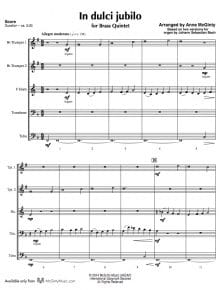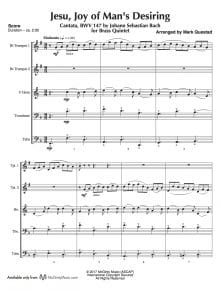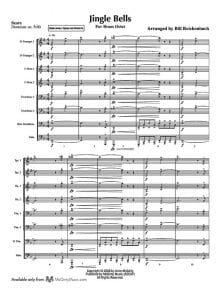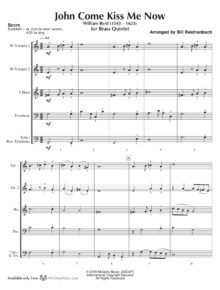Search Music
Music Categories
PDF Download Only
Purchase. Print. Play.
-
In dulci jubilo – Brass Quintet
In dulci jubilo is a traditional Christmas carol from the Middle Ages, first appearing in a manuscript dating from c.1400. It has been arranged by many composers, including Michael Praetorius in the 1600s, Buxtehude, Franz Liszt and Norman Dello Joio, to name just a few. An English translation from the original text that alternated Medieval German and Latin by J. M. Neale became known as Good Christian Men, Rejoice.
Johann Sebastian Bach wrote a choral version (BWV 368), and a double canon (BWV 608) and chorale prelude (BWV 729) for organ. There is also a chorale prelude for organ based on a naive cradle-song version that was once used in the mystery plays held in churches at Christmas time. Although attributed to Bach, the cradle-song version (BWV 751) has never been authenticated.
This arrangement includes two versions, playable as one piece or separately, and begins with the cradle-song style. The simplicity as well as the imitation in the tuba pedal is quite charming and rather unexpected when compared to Bach’s usual complexity. The second version is based on the chorale prelude for organ and is a traditional postlude for Christmas services.
In the Complete Organ Works of Johann Sebastian Bach, edited by Edouard Nies-Berger and Dr. Albert Schweitzer, they state that the harmonizations of chorales were not usually written out as the figured bass was enough. These editors also assumed that Bach had a reason and suggest that he wrote them for his own satisfaction or, more likely, for use with his pupils in the course of instruction in thorough-bass playing.
Composer: Anne McGinty
Instrumentation: 2 BbTrumpets, F Horn, Trombone & Tuba
Duration/# of Pages: ca. 3:20 / 22 pages, 8.5″ x 11″
Key: F -
Jesu, Joy of Man’s Desiring – Brass Quintet
The chorale movement from Cantata BWV 147, Herz und Mund und Tat und Leben is arguably one of the most recognizable compositions by Johann Sebastian Bach. In this arrangement, the trumpets share the famous obbligato while the others provide the orchestra and the chorale.
Composer: Mark Questad
Instrumentation: 2 Bb Trumpets, F Horn, Trombone & Tuba
Duration/# of Pages: ca. 2:30 / 19 pages, 8.5″ x 11″
Key: F -
Jingle Bells – Brass Octet
“Unbelievably grand and majestic” – this is Jingle Bells as you’ve never heard it before! Bill Reichenbach has added an unexpected and powerful intro to this clever arrangement, with the traditional carol enlivened with jazz licks, a little swing, the Dreidel Song as an unexpected bridge and some Sousa thrown in just for fun. The perfect Christmas concert closer!
Performers:
Larry Hall, David Washburn – Trumpet
Mark Adams, Joe Meyer – Horn
Alex Iles, Andy Malloy – Trombone
Bill Reichenbach – Bass Trombone
Doug Tornquist – TubaComposer: Bill Reichenbach
Instrumentation: 2 Bb Trumpets, 2 F Horns, 2 Tenor Trombones, Bass Trombone & Tuba
Duration/# of Pages: ca. 3:00 / 24 pages, 8.5″ x 11″
Key: N/A -
John Come Kiss Me Now – Brass Quintet
This piece is No. X from the Fitzwilliam Virginal Book. Byrd was the leading English composer of his generation, and was a protegé of Thomas Tallis. This arrangement by Bill Reichenbach remains faithful to Byrd’s original music, and the brass quintet instrumentation adds color and dynamic shading to intensify the expressive qualities of the music. This piece was made popular to instrumentalists in Gordon Jacob’s William Byrd Suite for band.
An optional ending has been added if you want to stop where the band piece ends. There is also an option to continue, and it gets quite note-y, but provides an excellent opportunity to showcase technical and rhythmical facility. Slurs have been added to facilitate some of the runs, and may be ignored if so desired. Additional dynamics may be added according to the rise and fall of the melodic lines.
Composer: Bill Reichenbach
Instrumentation: 2 Bb Trumpets, F Horn, Trombone, Bass Trombone/Tuba
Duration/# of Pages: ca. 2:00 or 4:25 / 27 pages, 8.5″ x 11″
Key: N/A




